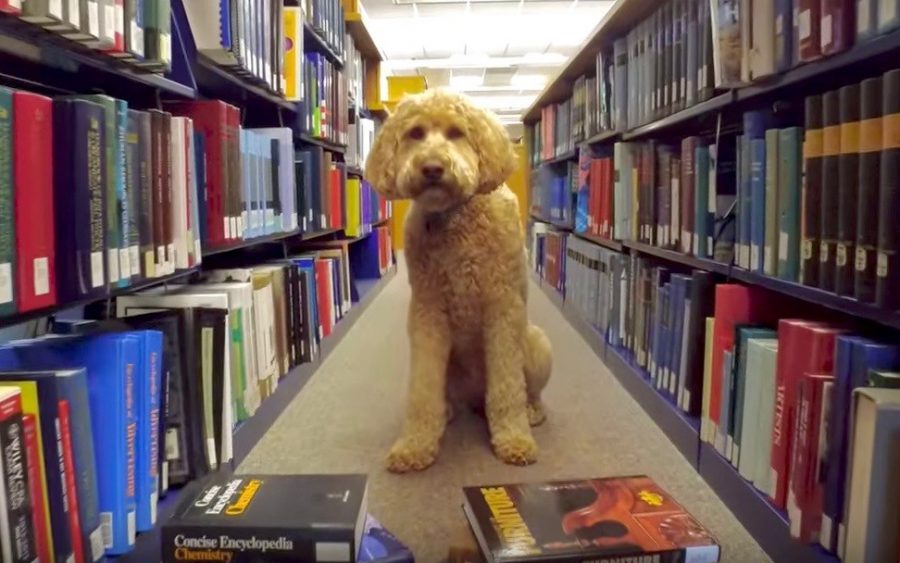Opinion: Animal outreach floor a fetching opportunity
The transition from high school to college can be challenging. Many students miss home, family, friends and pets. Imagine if during the lowest part of freshman year, you could wrap your arms around a loving dog who absorbs your anxiety, depression and loneliness into his welcoming fur.
According to the American Psychological Association (2013), anxiety is the most prevalent concern among college students (41.6%), followed by depression (36.4%) and relationship problems (35.8%). Adamle, Riley & Carlson (2009) reported that the majority of [college students] indicated that they had left family pets at home, missed their pets while at school or believed that pet therapy would be beneficial as a support program for stress reduction.
Calvin has shown dedication to promoting student health and welfare through the three floors dedicated to intentional living in Van Reken. However, there is an immense need to address these detrimental mental health issues that run rampant on Calvin’s campus. I challenge Calvin College to take an active stand in promoting students’ mental health by instituting an animal outreach residence hall with a resident dog.
Although there are already several dogs on campus belonging to Calvin faculty and residence directors–perhaps the most famous of which is Gus Le Roy–they are not accessible enough to allow for significant improvement in students’ mental health. Therefore, Calvin should designate first Timmer to be an animal outreach floor with a resident dog.
The dog would have one primary caretaker who would be selected in the same way that the other Community Life Council members are appointed. This caretaker would then delegate care to other members of the floor. For example, a different student would walk the dog each day. With so many students missing their pets at home, this dog would be incredibly well-loved and cared for. In return, the dog would promote the health of students by decreasing their anxiety, depression and loneliness.
The upcoming animal outreach floor has been met with resounding approval from the Calvin community. When asked whether they liked the idea of a ‘dog floor,’ Caroline Boss responded, “Hell yes!’ Nate Ross said, “Yeah, I’d definitely support that,” and Laurel Machiele said, “Yes, I am a major proponent!”
Matt Postma, associate chaplain for residence life, stated, “I love animals, so it would be difficult for me to feel short of optimistic about a program like this starting at Calvin. There is something disarming and soothing about a friendly dog – I can see a program like this bringing a lot of joy to residents at Calvin.”
Research indicates that animal outreach programs are effective. According to Phillips, et. al. (2011), 72% of students reported that their interactions with pets had strongly influenced the development of their values. Adamle, et al. (2009) reports that college students said that a pet therapy program would temporarily fill the absence of previous support systems and be a catalyst for establishing new social relationships.
According to two studies by Muckle & Lasikiewicz (2017) and Charneteski, Riggers, & Brennan, (2004), animal outreach programs with dogs also decrease anxiety and blood pressure while increasing self-esteem, immune system antibodies (IgA) and infection fighting capabilities.
A dog outreach program has enough research to support its validity with Calvin students. If Calvin is a proponent of evidence-based practice, we should implement an animal outreach residence hall with confidence that it will be a success.
Although there are some concerns about a dog living in a residence hall, the benefits outweigh the risks. A hypoallergenic breed would be preferred to reduce the allergy symptoms of students not living on the ‘dog floor.’ The well-trained dog would be confined to only one floor to reduce unwanted contact. Calvin could recruit a local alumni or professor to provide a permanent second home for the dog. In this way, the same dog can form a relationship with first Timmer each semester, and have another home during breaks.
This program will provide opportunities for the nursing, psychology or social work departments to conduct original research. Calvin students will be both the subjects of the research project and the facilitators (under faculty mentorship). This will allow Calvin students to learn about research methodology. With inconsequential monetary commitment, Calvin can use animal outreach to take the initiative in promoting student health and providing student research opportunities.
Research clearly shows that the introduction of dogs into the lives of college students is beneficial in a multitude of ways. Calvin has the opportunity to pioneer a movement that will soon become common among colleges, if the advice of scientific research and the voices of college students are heeded.





Gus Le Roy • Nov 11, 2017 at 9:18 am
I just hijacked the prez-Mikey’s (my pet name for the president) computer to point out a few things: First, thanks for highlighting the central role that dogs play in helping to make humans feel better.. I don’t mean to self-promoting, but I do help to melt the anxiety of my peeps at the Manor. The prez can be a stress bucket sometimes. Second, my main objection to this editorial is that am described as “inaccessible.” I walk the campus 2-3 times per day to check to make sure that pesky squirrels aren’t hassling the students. My job can be stressful at times too, so a hug from a student makes my day. Feel free to stop me at any time Andrea and p-Mikey don’t mind at all. I like the idea of therapy dogs as long as they are hypo-allergenic, like to play, and aren’t mean. I will talk to p-Mikey and see what we can do about this.
Go Knights!
Gus
Marilyn Granner • Nov 10, 2017 at 1:58 pm
Great idea and well supported in this article. Our dog, Gusto, loved visiting students on campus and the students often opened up with others about their struggles while interacting the therapy dogs. I think the biggest problem will be jealously amongst the other non-dog floors!